Table of Contents
📣 Attention marketers and business owners! Are you tired of lackluster ad performance on Meta platforms? It’s time to unlock the power of User-Generated Content (UGC) in your advertising strategy. 🚀
In today’s digital landscape, consumers crave authenticity and relatability. That’s where UGC comes in. By leveraging content created by your own customers, you can skyrocket your conversions and build genuine connections with your audience. But here’s the catch: not all UGC strategies are created equal. 🤔
Ready to supercharge your Meta ads with UGC? In this comprehensive guide, we’ll dive into the best UGC ad strategies that will maximize your conversions. From crafting compelling content to optimizing ad placement, we’ll cover everything you need to know to harness the full potential of UGC in your Meta advertising campaigns. Let’s explore how you can transform your marketing approach and achieve incredible results! 💪
Understanding UGC in Meta Ads
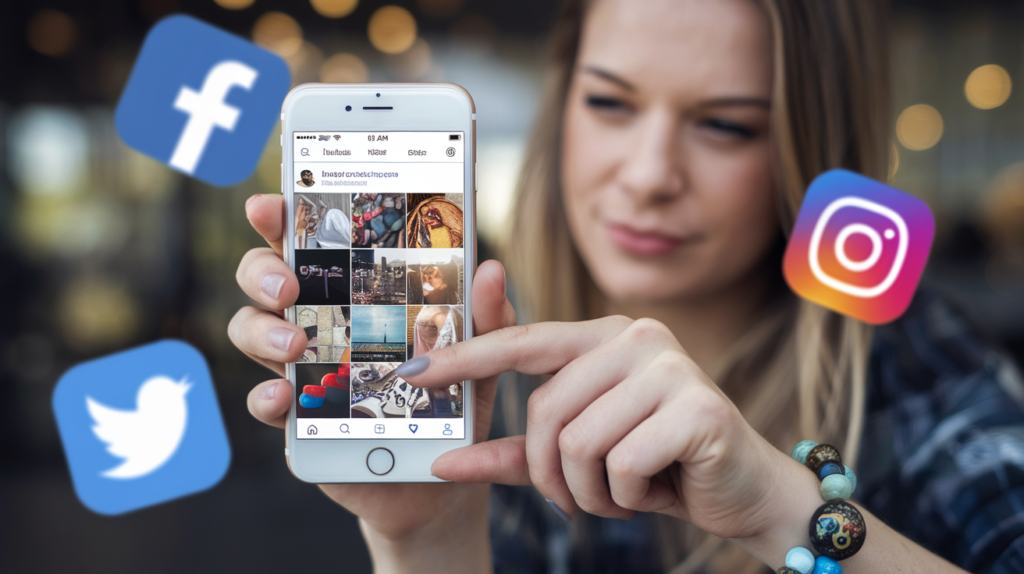
A. Definition and importance of UGC
User-Generated Content (UGC) refers to any form of content created by users or consumers of a brand, rather than the brand itself. In the context of Meta Ads, UGC can include customer reviews, testimonials, social media posts, and user-created videos or images. The importance of UGC lies in its authenticity and relatability, which can significantly boost trust and engagement among potential customers.
B. Benefits of UGC for conversions
UGC offers numerous advantages for improving conversion rates in Meta Ads:
- Increased trust and credibility
- Higher engagement rates
- Cost-effective content creation
- Improved social proof
- Enhanced brand loyalty
Benefit | Description |
Trust | Authentic user experiences build credibility |
Engagement | Relatable content encourages interaction |
Cost-efficiency | Reduces production costs for ad content |
Social proof | Real user endorsements influence decisions |
Loyalty | Fosters a sense of community around the brand |
C. Types of UGC suitable for Meta Ads
Several types of UGC can be effectively leveraged in Meta Ads:
- Customer reviews and ratings
- User-created photos and videos
- Testimonials and success stories
- Social media mentions and hashtags
- User-submitted questions and answers
Each type of UGC serves a unique purpose in the ad strategy, catering to different stages of the customer journey and addressing various aspects of the product or service. By incorporating a mix of these UGC types, brands can create a comprehensive and authentic ad campaign that resonates with their target audience on Meta platforms.
Crafting Compelling UGC Ad Content

Identifying authentic and relatable user stories
To create compelling UGC ad content, start by identifying authentic user stories that resonate with your target audience. Look for customers who have had genuine, positive experiences with your product or service. Engage with your community through social media, customer feedback channels, and surveys to uncover these valuable stories.
Balancing user testimonials with product features
When crafting your UGC ads, strike a balance between showcasing user testimonials and highlighting product features. This approach ensures that your audience understands both the real-world benefits and the key selling points of your offering.
User Testimonial | Product Feature |
“This app saved me hours of work!” | AI-powered task automation |
“I’ve never felt more confident in my skin” | Dermatologist-tested formula |
“My energy levels have skyrocketed” | Proprietary vitamin blend |
Incorporating user-generated visuals effectively
Visual content is crucial for engaging Meta ad campaigns. Incorporate user-generated images and videos that showcase your product in action. Consider the following tips:
- Use high-quality, authentic visuals that align with your brand aesthetic
- Feature diverse users to appeal to a broader audience
- Include before-and-after shots to demonstrate product effectiveness
- Showcase creative ways customers use your product
Leveraging user reviews and ratings
Harness the power of user reviews and ratings to build trust and credibility in your UGC ads. Here’s how to effectively incorporate this social proof:
- Highlight star ratings prominently in your ad visuals
- Use short, impactful quotes from positive reviews
- Showcase the number of satisfied customers or positive reviews
- Include ratings from trusted third-party platforms for added credibility
By following these strategies, you’ll create UGC ad content that resonates with your audience and drives conversions on Meta platforms.
Optimizing UGC Ad Placement

Choosing the right Meta ad formats for UGC
When optimizing UGC ad placement on Meta platforms, selecting the appropriate ad format is crucial. Each format offers unique advantages for showcasing user-generated content effectively.
Ad Format | Best for UGC | Key Benefits |
Stories | Short videos, testimonials | Immersive, full-screen experience |
Reels | Creative, trendy content | High engagement, viral potential |
Carousel | Product reviews, before/after | Multiple pieces of UGC in one ad |
Feed Posts | Photos, longer videos | Native appearance, detailed content |
Targeting specific audience segments with UGC
To maximize the impact of your UGC ads, it’s essential to target the right audience segments. Consider these strategies:
- Lookalike audiences based on existing customers
- Interest-based targeting aligned with UGC themes
- Retargeting users who’ve engaged with your brand
- Custom audiences from your email lists or website visitors
A/B testing UGC placements for maximum impact
Continuous optimization through A/B testing is key to improving UGC ad performance. Test various elements such as:
- Ad placement (Feed vs. Stories vs. Reels)
- Ad copy accompanying UGC
- Call-to-action buttons
- UGC content types (videos vs. images)
By systematically testing these variables, you can identify the most effective combinations for driving conversions. Remember to analyze metrics like click-through rates, engagement, and conversion rates to inform your decisions. With these strategies in place, you’ll be well-equipped to optimize your UGC ad placements on Meta platforms for maximum impact and conversions.
Encouraging UGC Creation for Ad Campaigns

Running contests and giveaways
Contests and giveaways are powerful tools to encourage UGC creation for your Meta ad campaigns. By offering exciting prizes, you can motivate users to create and share content that aligns with your brand. Here’s a comparison of different contest types:
Contest Type | Engagement Level | Complexity | Potential Reach |
Photo Contest | High | Low | Medium |
Video Challenge | Very High | Medium | High |
Caption Contest | Medium | Low | Low |
Creative Story | High | Medium | Medium |
Offering incentives for user submissions
Incentives can significantly boost UGC participation. Consider these effective incentive strategies:
- Discount codes for future purchases
- Exclusive access to new products
- Featured spotlight on your brand’s social media
- Gift cards or branded merchandise
Creating branded hashtags for easy content discovery
Branded hashtags are essential for organizing and discovering UGC. Follow these best practices:
- Keep it short and memorable
- Ensure it’s unique to your brand
- Use it consistently across all platforms
- Incorporate it into your overall marketing strategy
Engaging with your community to inspire participation
Building a strong community is key to inspiring UGC creation. Engage your audience by:
- Responding promptly to comments and messages
- Sharing and highlighting user-submitted content
- Hosting live Q&A sessions or behind-the-scenes content
- Creating exclusive groups or forums for brand enthusiasts
By implementing these strategies, you’ll foster a thriving community that actively contributes to your UGC ad campaigns. Next, we’ll explore how to measure and analyze the performance of your UGC ads to ensure maximum conversions.
Measuring and Analyzing UGC Ad Performance

Key metrics to track for UGC ads
When measuring the performance of UGC ads on Meta platforms, it’s crucial to focus on specific metrics that indicate engagement and conversions. Here are the essential metrics to monitor:
- Click-Through Rate (CTR)
- Conversion Rate
- Cost Per Acquisition (CPA)
- Engagement Rate (likes, comments, shares)
- Video View Duration (for video UGC)
- Return on Ad Spend (ROAS)
Using Meta's analytics tools effectively
Meta’s Ads Manager provides powerful analytics tools to track and analyze your UGC ad performance. To maximize their effectiveness:
- Set up custom conversions
- Use the Breakdown feature to segment data
- Create custom reports for UGC-specific insights
- Utilize the A/B testing feature for optimization
Comparing UGC ad performance to traditional ads
Metric | UGC Ads | Traditional Ads |
CTR | Often higher | Varies |
Trust factor | Higher | Lower |
Cost-effectiveness | Generally better | Can be expensive |
Authenticity | High | Lower |
Iterating and improving based on data insights
To continuously enhance your UGC ad performance:
- Analyze top-performing content characteristics
- Adjust targeting based on audience engagement
- Refine messaging and visuals using A/B test results
- Experiment with different UGC formats (photos, videos, stories)
- Regularly update your UGC content to maintain freshness
By focusing on these key areas and leveraging Meta’s analytics tools, you can effectively measure and optimize your UGC ad campaigns for maximum conversions. Remember to always compare UGC performance against your traditional ads to understand the true impact and ROI of your user-generated content strategy.
Ensuring Compliance and Authenticity

Obtaining proper permissions for UGC use
When leveraging user-generated content (UGC) in Meta ads, obtaining proper permissions is crucial. Here’s a step-by-step guide to ensure compliance:
- Develop a clear UGC policy
- Create a user-friendly consent form
- Implement a content rights management system
- Educate your team on permission protocols
Permission Type | Description | Best Practice |
Explicit Consent | Direct permission from content creator | Use for all UGC in ads |
Terms of Service | General agreement for content use | Supplement with explicit consent |
Creative Commons | Open-source licensing | Verify license type and attribution |
Maintaining transparency in UGC ads
Transparency builds trust with both users and potential customers. To maintain transparency:
- Clearly label UGC in ads
- Provide context for the content
- Disclose any incentives given to content creators
- Use authentic, unedited UGC whenever possible
Adhering to Meta's advertising policies
Meta has strict guidelines for UGC in ads. Key points to remember:
- No misleading or false content
- Respect intellectual property rights
- Comply with community standards
- Follow industry-specific regulations
Preserving the authenticity of user content
Authenticity is the core value of UGC. To preserve it:
- Minimize editing of original content
- Use real user testimonials and experiences
- Showcase diverse perspectives
- Avoid over-curating UGC to maintain relatability
By ensuring compliance and authenticity in your UGC ads, you’ll build trust with your audience and maximize the effectiveness of your Meta ad campaigns. Next, we’ll explore how to integrate UGC ads into your overall marketing strategy for a cohesive brand message.
Integrating UGC Ads with Overall Marketing Strategy

Aligning UGC ads with brand messaging
To create a cohesive marketing strategy, it’s crucial to align UGC ads with your brand’s core message. This alignment ensures consistency across all touchpoints and reinforces your brand identity. Here are some key steps to achieve this:
- Define your brand voice
- Identify key brand messages
- Create guidelines for UGC creators
- Review and curate UGC content
Brand Element | UGC Alignment Strategy |
Tone | Provide examples of desired tone in UGC |
Visual Style | Share brand color palette and imagery guidelines |
Key Messages | Highlight core messages for creators to incorporate |
Values | Communicate brand values to guide UGC creation |
Combining UGC with influencer marketing
Leveraging influencers to create UGC can amplify your marketing efforts. This powerful combination increases authenticity and reach. Consider the following approaches:
- Collaborate with micro-influencers for niche audiences
- Host influencer-led UGC contests
- Provide influencers with product experiences to generate authentic content
Repurposing UGC across multiple channels
Maximize the impact of UGC by repurposing it across various marketing channels. This strategy ensures consistent messaging and increases content efficiency. Some effective repurposing methods include:
- Adapting UGC for different social media platforms
- Incorporating UGC into email marketing campaigns
- Featuring UGC on your website or product pages
- Using UGC in paid advertising across channels
Creating a cohesive customer journey with UGC touchpoints
Integrate UGC strategically throughout the customer journey to create a seamless experience. This approach builds trust and encourages conversions at various stages. Consider implementing UGC at these key touchpoints:
- Awareness: Use UGC in social media ads to attract new prospects
- Consideration: Display UGC reviews and testimonials on product pages
- Decision: Incorporate UGC in retargeting campaigns to nudge hesitant buyers
- Post-purchase: Encourage customers to create and share their own UGC
By integrating UGC ads with your overall marketing strategy, you create a more authentic and engaging brand experience that resonates with your audience across multiple channels and touchpoints.

User-generated content (UGC) has proven to be a powerful tool in Meta Ads, driving authenticity and relatability that can significantly boost conversions. By understanding the nuances of UGC in Meta’s advertising ecosystem, crafting compelling content, and optimizing ad placement, businesses can harness the full potential of this strategy. Encouraging UGC creation, measuring performance, and ensuring compliance are crucial steps in maximizing the impact of these campaigns.
To succeed with UGC in Meta Ads, integrate this approach into your overall marketing strategy. Embrace the authenticity that UGC brings to your brand, and leverage it to create meaningful connections with your audience. By doing so, you’ll not only increase conversions but also foster a community of engaged customers who become advocates for your brand. Start implementing these UGC ad strategies today and watch your Meta Ad performance soar.
Want to skyrocket your conversions with User-Generated Content (UGC) ads in 2025? At Viral Groww, we specialize in crafting high-performing UGC ad strategies that boost engagement and drive sales on Meta Ads. From selecting authentic creators to optimizing content for maximum impact, we help you build trust and credibility with your audience. Let’s turn social proof into sales and improve your ROAS—contact us today! 🚀
UGC refers to content created by users—such as reviews, photos, and videos—that brands use in ads to enhance authenticity and engagement.
Stories, Reels, Carousel, and Feed Posts are ideal for showcasing UGC, offering immersive and engaging experiences.
Brands can run contests, offer incentives, create branded hashtags, and engage with their community to inspire more UGC.
Click-through rate (CTR), conversion rate, engagement rate, cost per acquisition (CPA), and return on ad spend (ROAS) are essential metrics.
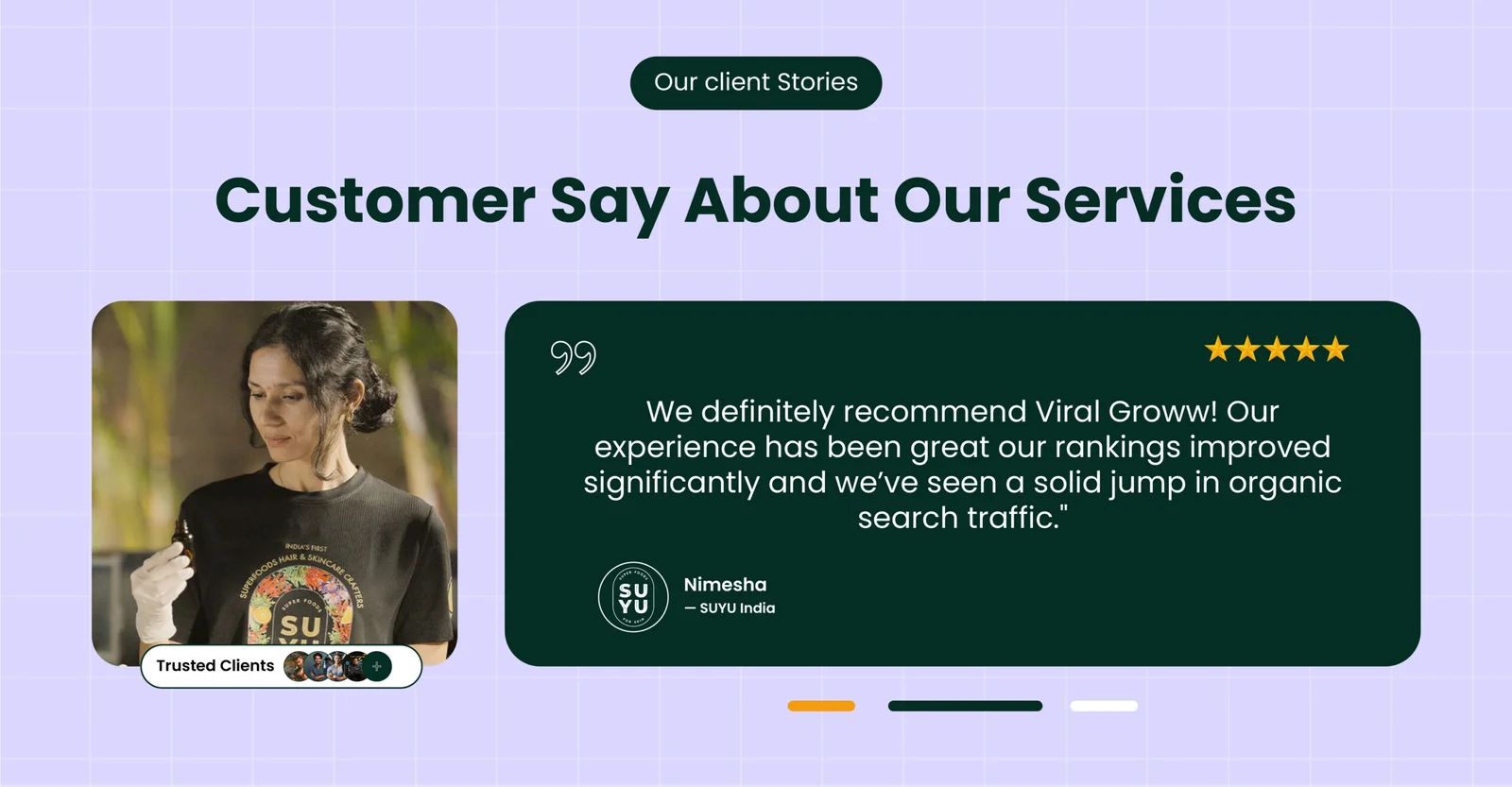
How We 2.5X’d Organic Traffic for SUYU India in Just 5 Months by Following Our White Hat SEO Framework
SUYU India was born with a clear vision—to bring superfood-powered skincare into the Indian market. Co-founded with a deep belief in sustainability.
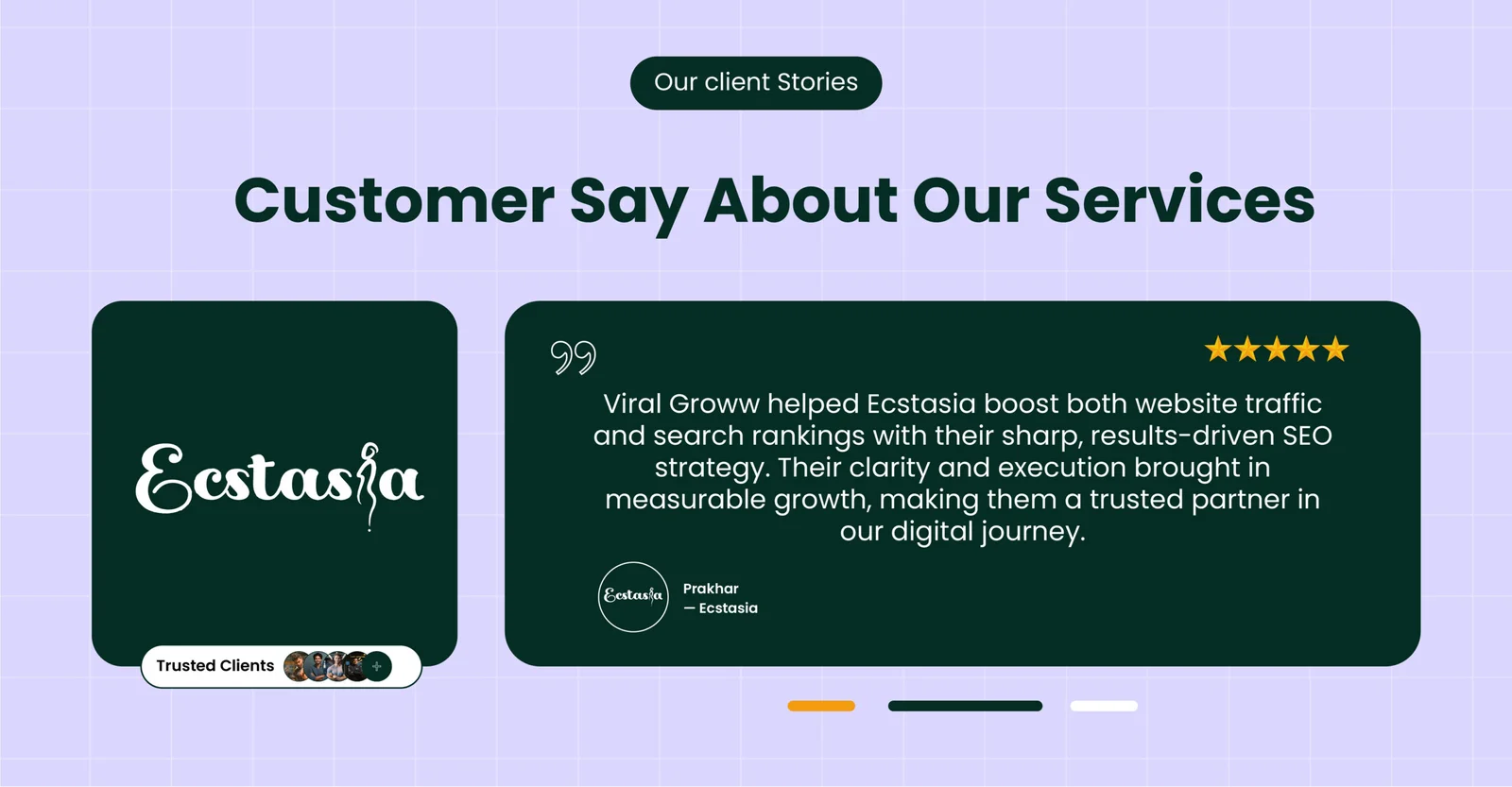
Scaling a Sexual Wellness Brand with SEO – How We Did It for Ecstasia
Ecstasia is a sexual wellness D2C brand started by Prakhar Raj and Hamid Iqbal in December 2024. Prakhar, a school friend of mine, works in a corporate job but has always wanted to start his own business.
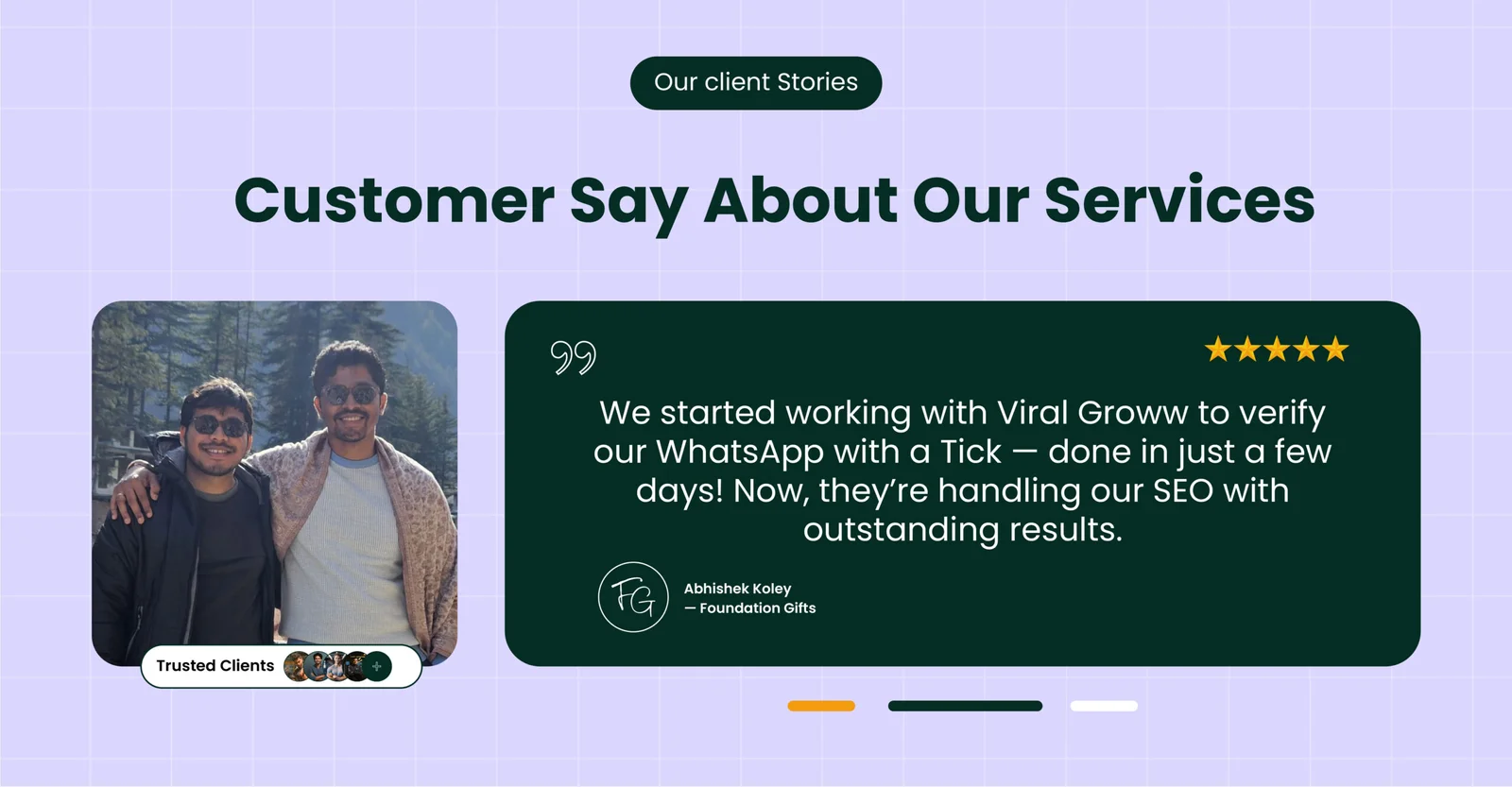
How we got 8.7X Impressions for a gifting D2C brand within 3 Months by doing White Hat SEO
Foundation Gift was started by Rakesh Adak and Abhishek Koley with a simple idea — gifts should feel just as special as the moments they celebrate.
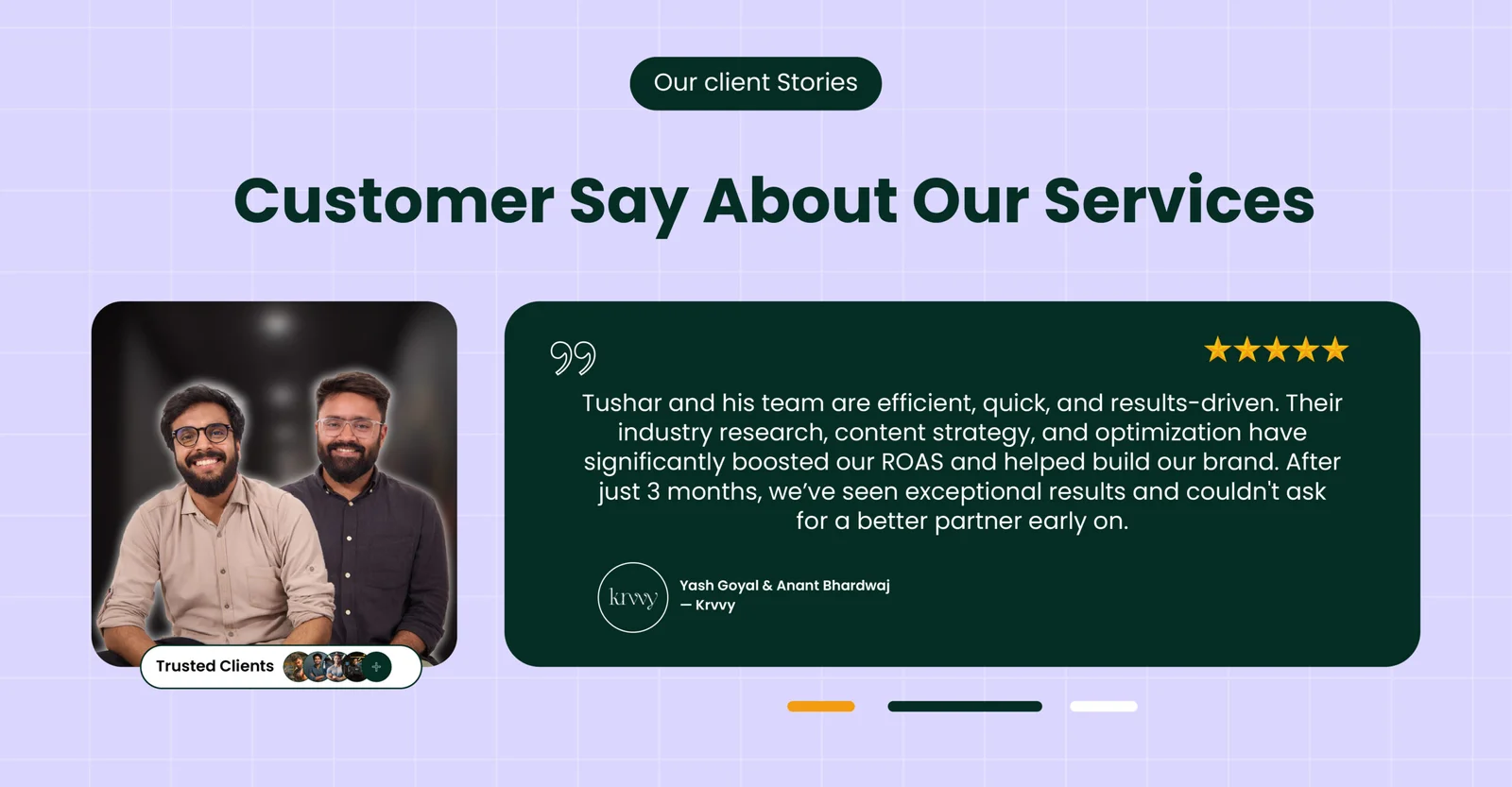
Scaling a Lingerie Brand to 7-Figure Sales in Just 75 Days—Proof Inside!
Krvvy is a modern, forward-thinking lingerie brand committed to redefining comfort and functionality. Designed to elevate the lingerie experience, Krvvy celebrates the beauty of all women, embracing and admiring every curve.
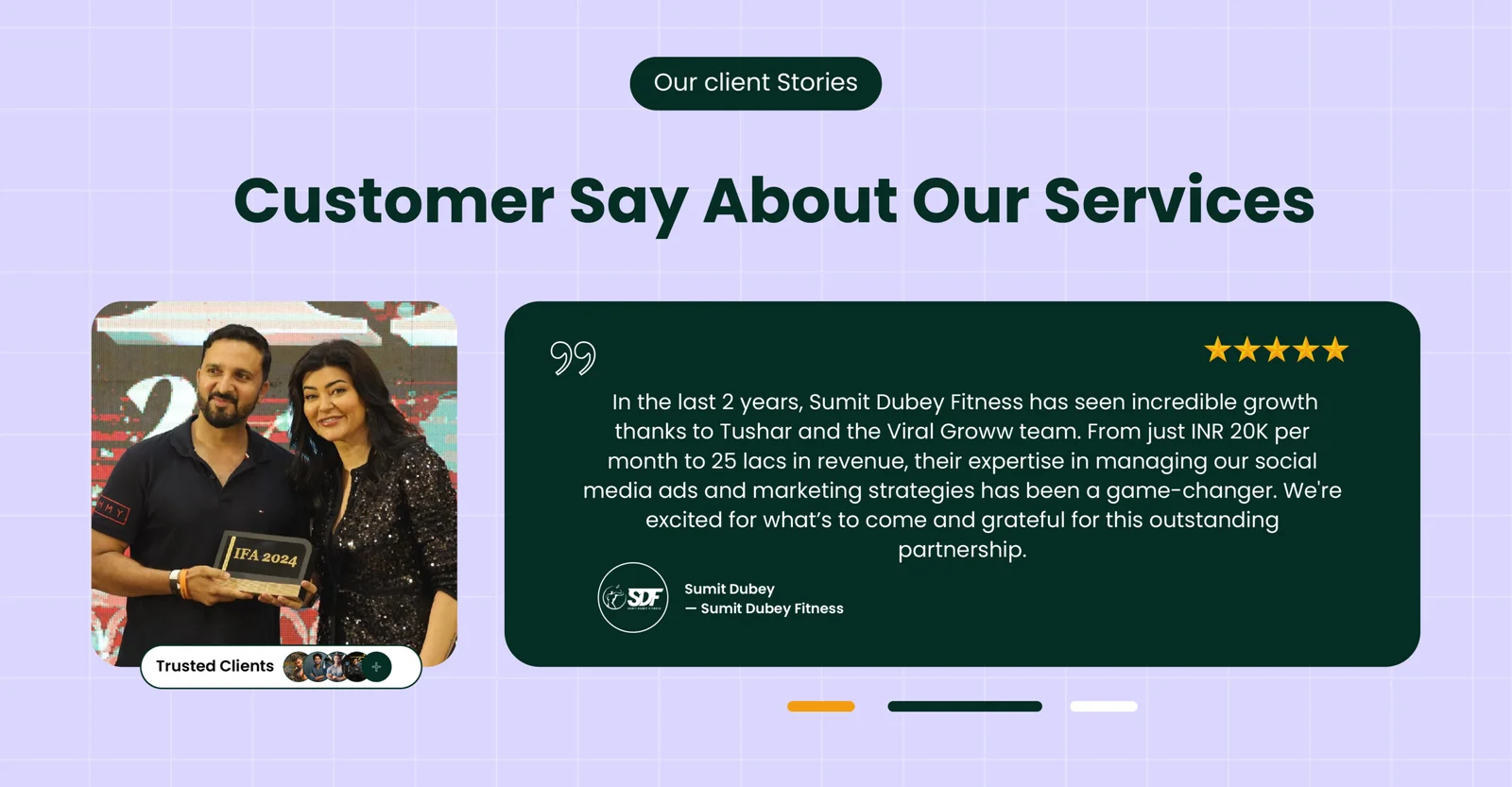
How Sumit Dubey Fitness Classes Transformed into a Fitness Empire with Strategic Digital Marketing
Sumit Dubey Fitness Classes, founded by Sumit Dubey, provides online fitness training with a personalized touch.
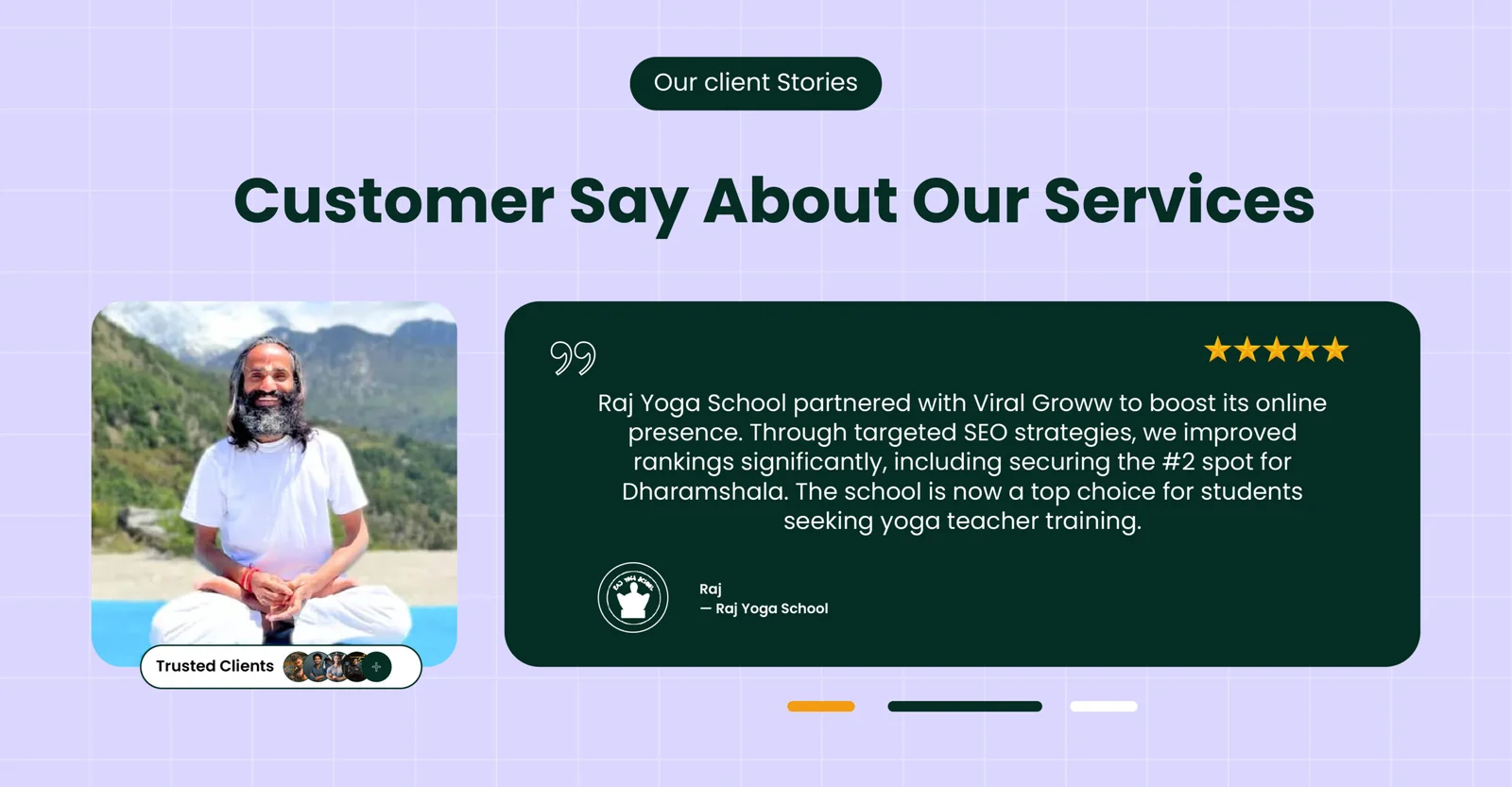
Raj Yoga School’s Journey to the Top of Search Rankings
Nestled between the tranquil peaks of the Himalayas and the sun-kissed beaches of Goa, Raj Yoga School has been a sanctuary for aspiring yoga teachers in India.
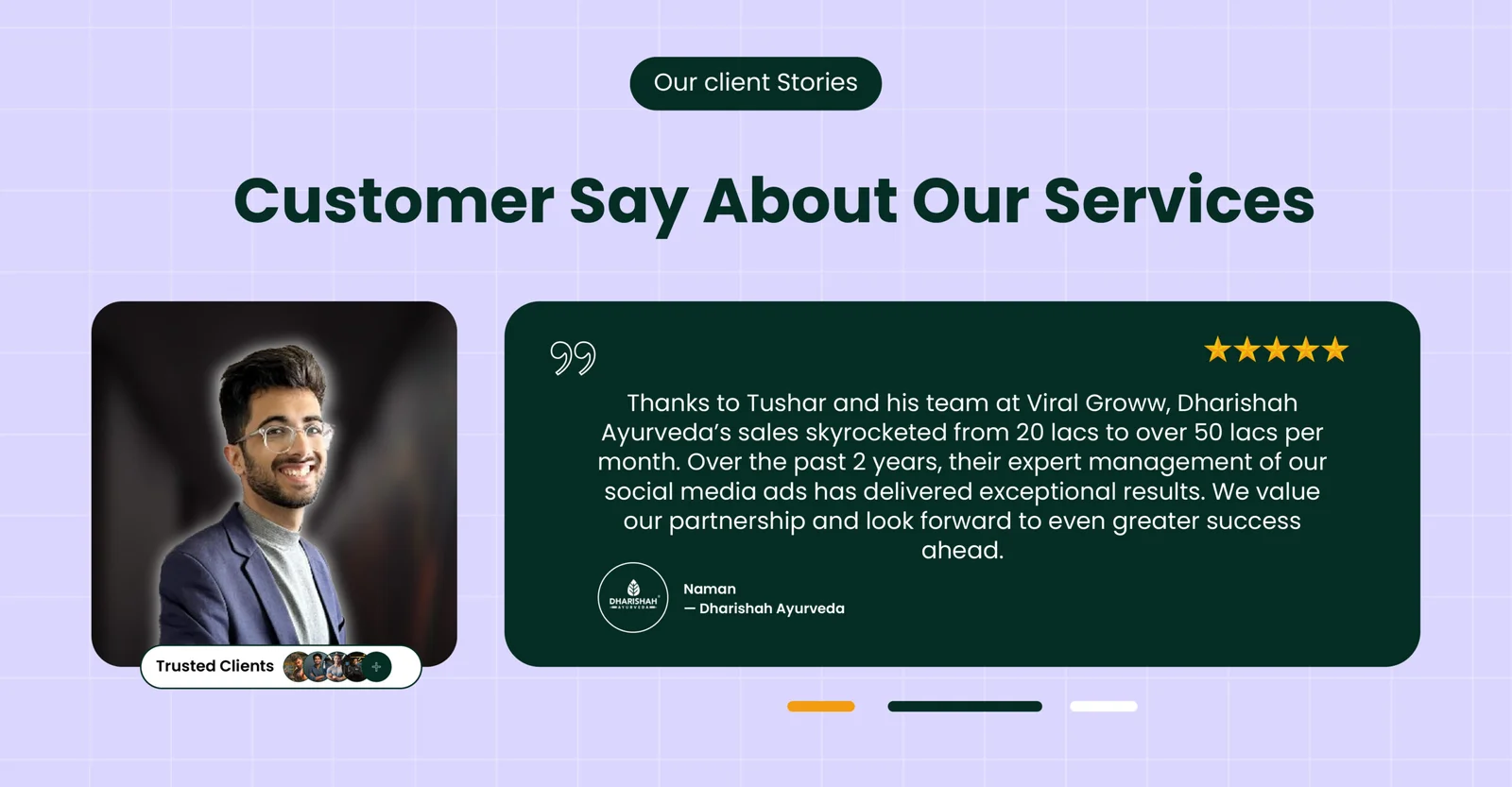
Scaling Dharishah Ayurveda from ₹20 Lakhs to ₹50 Lakhs in Monthly Sales
Dharishah Ayurveda, a promising Ayurvedic brand, had already seen growth through performance marketing, scaling from ₹2 lakhs to ₹20 lakhs in monthly sales (covered in a previous case study).

Building Trust and Revenue for Dharishah Ayurveda with Scalable Facebook Ads
Dharishah Ayurveda, led by CEO Naman Dhamija, is a premium Ayurvedic brand dedicated to promoting natural wellness.
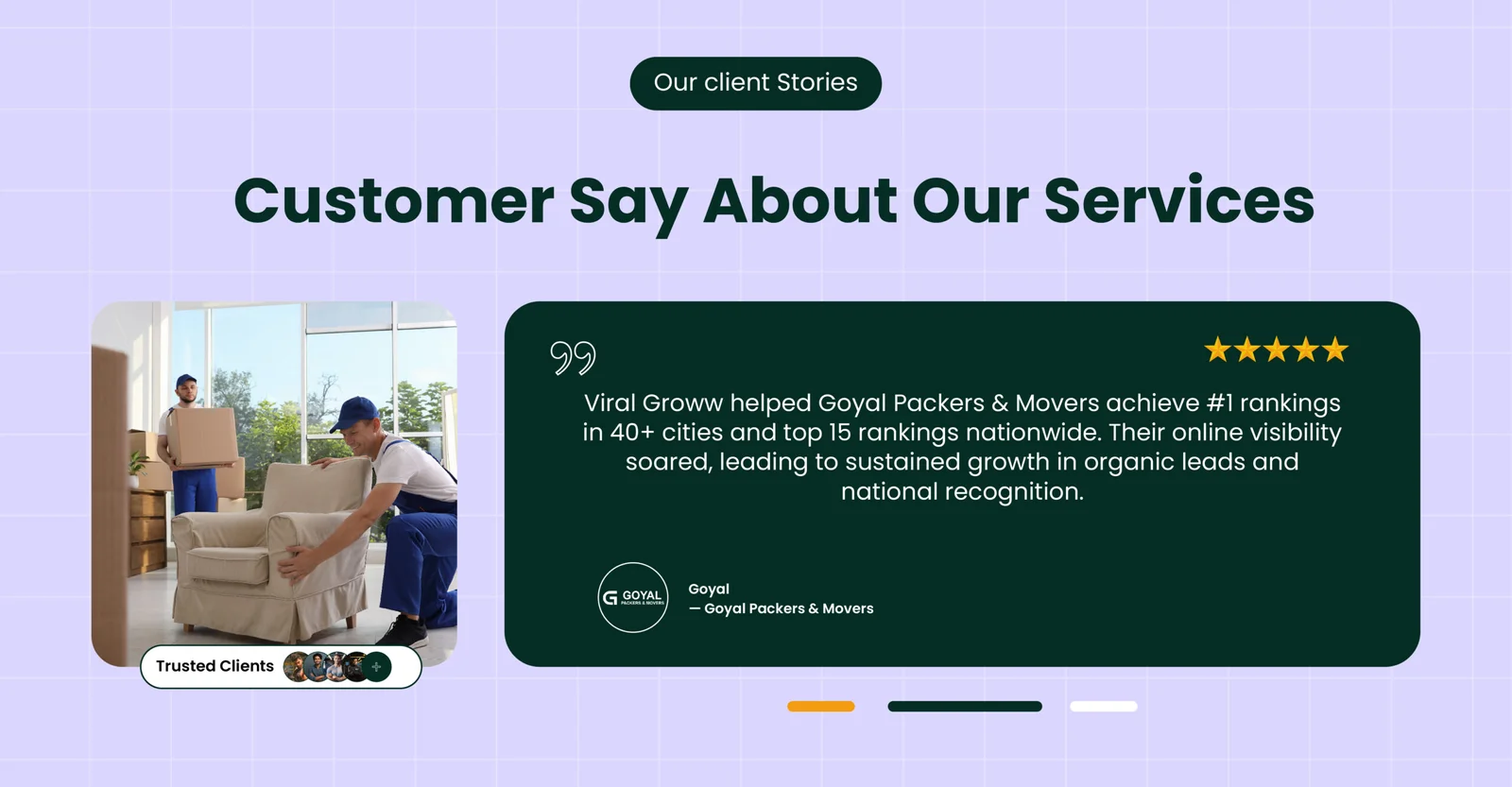
How Goyal Packers & Movers Skyrocketed to #1 in 40+ Cities with White Hat SEO
Goyal Packers and Movers India, owned by Mr. Sampat Singh, is one of the most preferred packers and movers across Northern India, offering exceptional shifting services.





